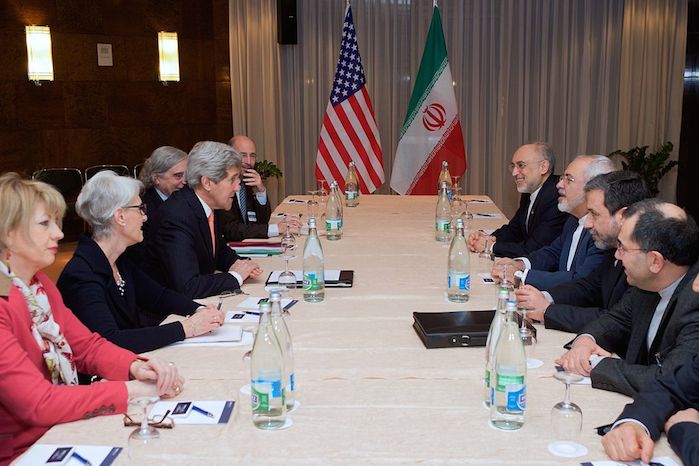Honor the Existing Nuclear Deal, Don’t Pursue a ‘New’ One

Robert Einhorn and Richard Nephew want the U.S. to pursue a new agreement with Iran instead of simply rejoining the JCPOA:
The Trump administration’s current approach has little chance of succeeding. But simply returning the United States to the Joint Comprehensive Plan of Action (JCPOA) is not a long-term solution. By the time the United States would return to the 2015 deal, key nuclear restrictions would soon expire. Moreover, achieving the wide domestic support needed to make a nuclear deal with Iran politically sustainable in the United States would not be served by simply turning the clock back to before Trump took office.
The United States needs to pursue a renewed nuclear bargain with Iran, building on the solid foundation of the original and addressing its shortcomings.
Pursuing a new agreement suffers from the same flaws as a conditional return to the JCPOA. In both cases, it assumes that Iran would be willing to renegotiate the same issue with a government that has not yet honored its side of the last bargain. Iran agreed to the current restrictions under broad international pressure that does not exist today and won’t exist in the future. It is fanciful at best to expect that Iran would be interested in extending those restrictions any further when the U.S. is effectively the only one insisting on this. Focusing on the provisions that expire is a mistake. It ignores that Iran agreed to those provisions in order to demonstrate that their nuclear program is peaceful. Once they have done that, they will expect to be treated like any other member of the Non-Proliferation Treaty. Coming back to them and demanding extensions will make it seem as if we are trying to hold them to a different standard in perpetuity, and they aren’t going to respond well to that.
Einhorn and Nephew call for “[i]mproving the incentives (primarily sanctions relief) that would be offered to Iran, both in terms of their scope and their reliability to deliver anticipated benefits, in order to persuade Iran to accept a renewed bargain that goes beyond the JCPOA,” but they don’t explain why Iran would agree to going “beyond the JCPOA” when they have received so little benefit from their adherence to the current agreement. If returning to the JCPOA is not a “long-term solution,” trying to renegotiate the terms of an agreement that Washington already violated is no solution at all.
If there was an opportunity to build on the JCPOA, Trump squandered it when he reneged on the deal. That bell cannot be unrung, and it makes little sense to spoil an opportunity for a new beginning under a different administration by demanding additional concessions. Since the U.S. is the party that has broken faith with all of the other parties to the deal, it is incumbent on our government to make amends. At the very least, that means rejoining the agreement without new demands or conditions. At that point, the Iranian government might eventually be open to other discussions, but attempting to limit their nuclear program even further would erase whatever goodwill might be earned by rejoining.
There is no appetite in Iran to renegotiate. U.S. withdrawal from the deal and the reimposition of sanctions have done considerable damage to the supporters of the JCPOA inside Iran. If a hard-line candidate prevails in the 2021 presidential election there will definitely be no interest at all in further nuclear negotiations, and no Iranian leader is going to stick his neck out for another round of nuclear talks with the government that has been unjustly sanctioning them for years. As Dina Smeltz and John Cookson explained earlier this week, the Iranian public has soured on the current deal, and the U.S. is viewed very unfavorably:
A recent IranPoll survey suggests the Iranian people are becoming so cynical about the outcome of the process that any attempt at new negotiations between the United States and Iran could be dead on arrival.
They are referring to the same survey that I discussed here. One of the results from that poll bears repeating:
Iranians are very wary of negotiating with major powers: 72% agree that the nuclear deal experience has shown them that “it is not worthwhile for Iran to make concessions when negotiating with world powers, because Iran cannot have confidence that if it makes a concession world powers will honor their side of an agreement.” The lesson that most Iranians have taken from the nuclear deal is that their government gave away too much without getting much in return. U.S. deal-breaking has convinced them that they can’t trust foreign governments to honor their bargains.
If a new administration starts making demands for additional concessions from Iran, they are sure to encounter rejection right away. Instead of antagonizing Iran further with more demands, a new administration would be well-advised to make lifting sanctions on Iran a priority. That would signal to both Iran and our European allies that the U.S. is giving up on the Trump administration’s destructive economic warfare, and it would earn the new president some goodwill. That could form the basis for reopening channels of communication between our governments, and that in turn should make it easier for the U.S. to discuss the release and return of American citizens wrongfully detained in Iran. It will take time and patience to regain the trust that the current administration destroyed, and that isn’t going to happen if the next administration starts off with demands for bigger concessions than Iran was prepared to make earlier.